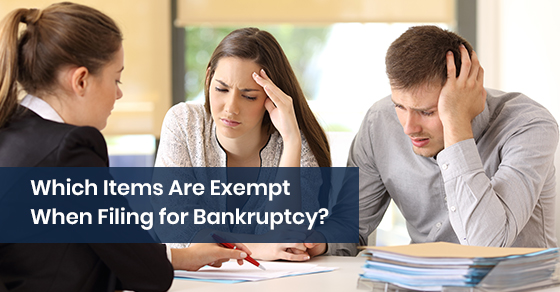Bankruptcy can be a scary word. It can be frightening to think that all your assets, whatever they may be, will be taken from you and used as a way to help pay off your debts to your creditors. However, this is a common misconception.
When you file for bankruptcy, it can be a great way to utilize legal assistance to help clear all of your debts, free yourself from any legal action by creditors, and start with a clean slate. The procedure followed when you file for bankruptcy can appear like a punishment, but this, however, is not the correct way to think about this.
Bankruptcy can be rehabilitation for your current financial situation. You will not be expected to surrender all of your assets in a bankruptcy case, and each province has slightly varying exemptions to what is and is not an asset that can be seized by your trustee and used against your debts.
The overall concept of bankruptcy is to obtain protection from creditors to whom you owe money. You surrender your assets to your chosen trustee in exchange for release from all of your debts.
You may be wondering how you can live without some of your important assets, such as basic living expenses. This is why the exemptions are outlined to help you hold on to some of the necessities as you begin to start a new financial chapter in your life.
What assets can I hold on to during bankruptcy?
Overall, the types of assets which are exempt from the bankruptcy process are similar across Canada. However, how much of each asset that is kept during bankruptcy can vary slightly from one province or territory to the next. The types of assets which are exempt from bankruptcy in Ontario include the following:
- Basic clothing and other personal items
- Home furnishings and appliances up to a value of $13,150
- Tools which are required for your work up to $11,300 in value
- A single motor vehicle up to $6,600 in value (if your car is worth more than $6,600 you can pay the difference to your trustee in order to keep your car). Financed vehicles are usually not an issue as it has no value to the trustee as you owe more than it is worth.
- Certain farm property including livestock, fowl, bees, books, tools, and other chattels, which are used as part of an individual’s occupation up to $29,100 in value
- Your RRSPs and RDSPs, which were not contributed within the 12 months prior to filing for bankruptcy
- Certain types of life insurance
How does a mortgage affect bankruptcy exemptions?
It’s important to understand what assets are and are not exempt from bankruptcy. The best way to do this is to seek advice from a Licensed Insolvency Trustee before you file for bankruptcy.
In regards to a mortgage on your house or car, the bankruptcy exemption applies to the equity you have acquired on that asset. The equity refers to the value of an asset after any debt amount has been deducted.
Most individuals who own a house and file for bankruptcy in Ontario have a mortgage on their house. Your main residence is exempt from bankruptcy as long as the equity of your home does not exceed $10,000. If the equity of your home does exceed $10,000, then the trustee will deal with your equity.
Why are some assets exempt from bankruptcy?
If you are struggling with numerous debts and do not have the income or assets to pay them off, bankruptcy can be the best solution if you are an honest but unfortunate debtor. Filing for bankruptcy can be a great way to help you start with a clean slate.
Your debts will be discharged, and certain assets of yours will be used to help settle debts with all of your creditors. Your assets are given to a Licensed Insolvency Trustee, who converts these assets into cash and equally distributes the monetary value among all of your creditors.
As useful as this technique is, it may seem like you will be left with nothing. Luckily, this isn’t true. Some assets are exempt from bankruptcy because, to live, you will require some essential items as a starting point for your new debt-free future ahead.
If you file for bankruptcy, assets that are required for you to survive, earn an income, and provide for your family are exempted and are yours to keep. Essential assets are exempt from bankruptcy and laws have been created to outline these exemptions.
The thought of bankruptcy can be scary, but the thought of being left with nothing shouldn’t be a fear. Bankruptcy laws have been put into place to ensure that just because some of your assets have been surrendered, it does not mean that you will be left without the basic tools you need for your new start.
Bankruptcy laws ensure that there are exemptions to the assets which can be taken from you so that you are not left without your dignity and essential items. Bankruptcy exemptions are unique to the province or territory in which you reside and can change over time, so make sure you seek professional advice to help you hold on to as many assets as you are entitled to.
To learn more about which items are exempt from bankruptcy, call Kevin Thatcher & Associates at 1-888-329-5198 or contact us here.

